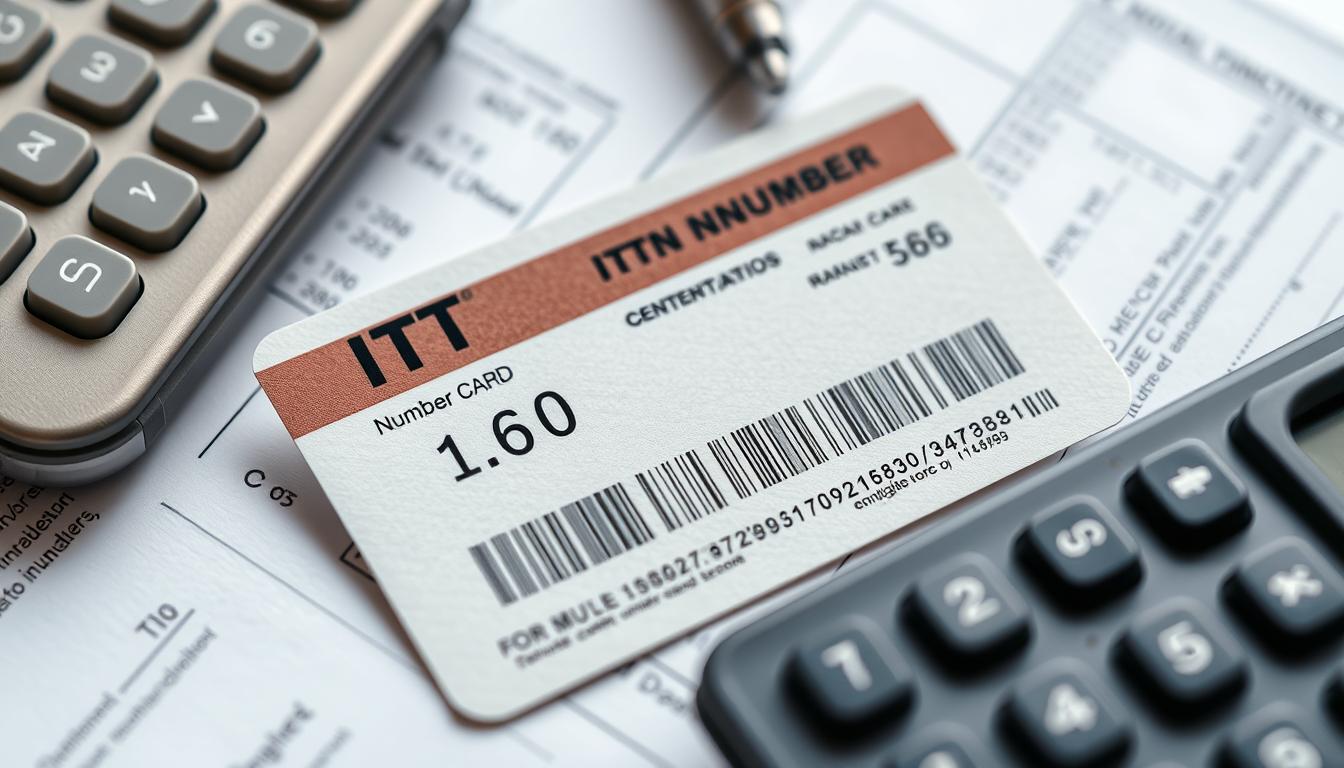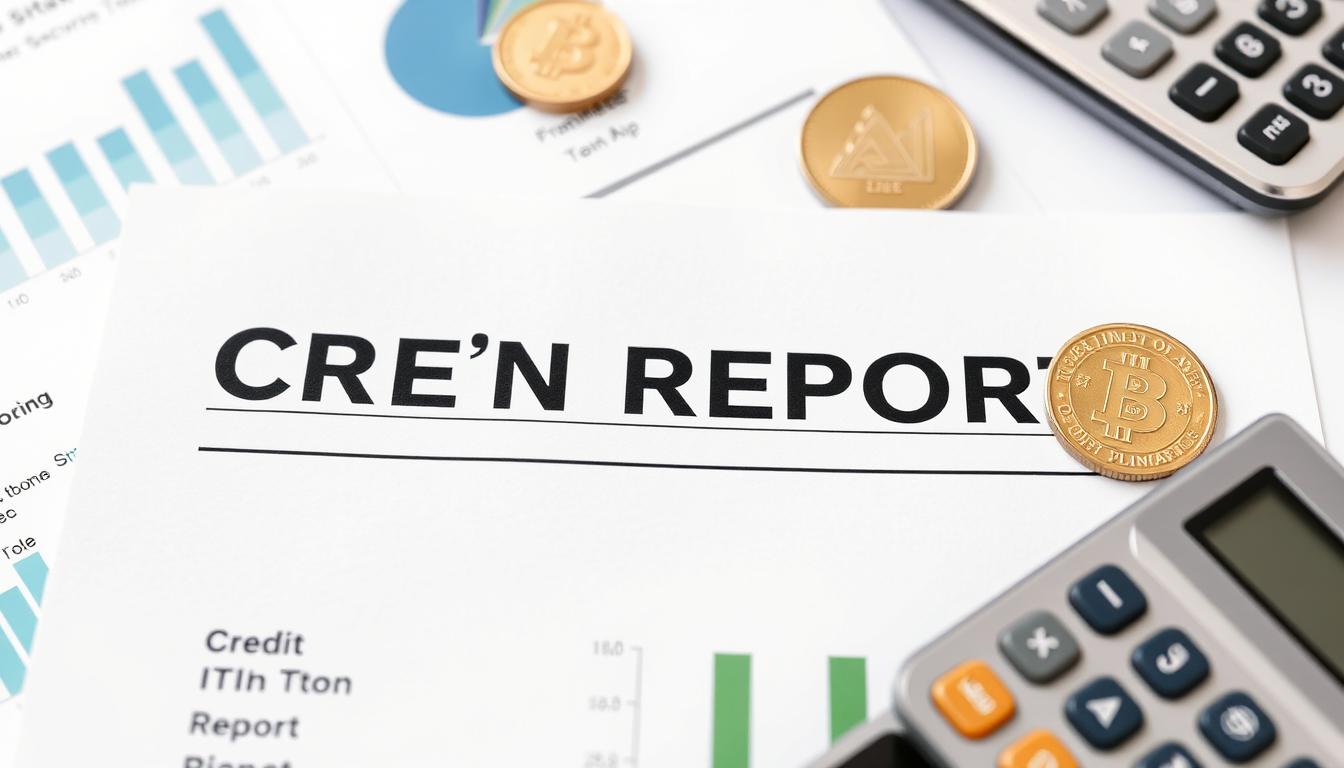Credit can be tricky for immigrants and non-residents. But with the right tools, you can master your credit report. This guide will help you understand credit reports for non-citizens.
We’ll show you how to get an ITIN credit report. You’ll also learn ways to build and improve your credit score. This knowledge can unlock your financial future.
Key Takeaways
- Understanding the significance of credit reports for immigrants and non-residents in the United States
- Discovering the steps to obtain a free credit report using your ITIN number
- Exploring the authorized credit bureaus and their processes for handling ITIN credit requests
- Learning how to interpret your credit score and credit history to make informed financial decisions
- Identifying strategies to build and improve your credit as a non-citizen
Understanding the Importance of Credit Reports for Non-Citizens
Credit reports are vital in today’s financial world. They determine access to various financial products and services. For immigrants and non-residents, building strong credit is challenging but crucial for financial stability.
Why Credit Matters for Immigrants and Non-Residents
Good credit is essential for non-citizens seeking housing, loans, or employment. Lenders and landlords use credit reports to assess creditworthiness. Without a non-citizen credit history, immigrants may face barriers to credit access for non-residents.
This can hinder their ability to fully participate in their new country’s economy. A solid credit history opens doors to financial opportunities and independence.
Overcoming Barriers to Building Credit History
- Lack of credit history and credit score: Many immigrants and non-residents have limited or no credit history, making it difficult to establish a credit profile.
- Unfamiliarity with the credit system: Navigating the complexities of the credit system can be daunting for those new to the country, leading to confusion and missed opportunities.
- Lack of access to immigrant credit resources: Immigrants and non-residents may not be aware of the available credit solutions for non-citizens and support services that can help them build credit.
Overcoming these barriers is crucial for non-citizens seeking financial stability. Understanding credit reports is key to unlocking non-citizen credit history. It leads to greater financial inclusion and security.
By addressing these challenges, immigrants can access the same credit access for non-residents as native-born individuals. This paves the way for a solid financial future.
What is an ITIN Number, and Why is it Crucial?
An ITIN (Individual Taxpayer Identification Number) is vital for non-citizens in the U.S. The IRS issues this nine-digit number to those ineligible for a Social Security number. It’s necessary for filing taxes and accessing financial services.
The ITIN credit check helps non-citizens build credit history in the United States. With an ITIN, people can open bank accounts, get credit cards, and apply for loans.
This number allows non-citizens to create a credit history. It’s key for getting financial products and services. An ITIN can improve one’s financial standing and quality of life.
Non-citizens can use ITINs to file tax returns. This helps them meet tax obligations and possibly claim credits or deductions. It shows their commitment to contributing to the U.S. economy.
“The ITIN is a game-changer for non-citizens, providing them with the means to establish their financial identity and access the resources they need to thrive in the United States.”
The ITIN number is crucial for non-citizens in the U.S. It allows them to join the financial system and build credit. With an ITIN, they can access resources to achieve their goals.

Obtaining Your Free Credit Report With ITIN Number
Getting a free credit report with your ITIN is vital for non-citizens and immigrants. It helps build and monitor your credit profile. Let’s explore how to do this effectively.
Authorized Credit Bureaus and Their Processes
Experian, Equifax, and TransUnion are the three major credit bureaus in the United States. They all accept ITIN numbers for credit reporting. You’ll need to contact each bureau separately to get your free report.
- Experian: You can request your free credit report online, by mail, or by phone. Be prepared to provide your ITIN, personal information, and proof of identity.
- Equifax: You can access your free credit report through their website or by mail. You’ll need to submit your ITIN and other identifying documents.
- TransUnion: Their online portal allows you to request your free credit report using your ITIN. You may also need to provide additional information to verify your identity.
Required Documentation for ITIN Credit Requests
When requesting your free credit report with an ITIN, you’ll need specific documents. These typically include:
- A copy of your ITIN card or a letter from the IRS confirming your ITIN number
- A valid government-issued photo ID, such as a passport or driver’s license
- Proof of address, such as a utility bill or bank statement
- Any other documents the credit bureau may require to verify your identity and ITIN
Getting your free credit report with itin number is a key step. It helps with itin credit monitoring and boosts your financial knowledge. Follow these steps to take control of your credit profile.

Reviewing and Understanding Your ITIN Credit Report
Getting your free ITIN credit report is just the start. The real challenge is understanding what’s in it. This report shows your financial standing as a non-citizen.
Interpreting Credit Scores and Credit Histories
Your ITIN credit report reveals your itin credit score and credit history. These elements determine your creditworthiness and financing options. By analyzing them, you can find ways to improve your non-citizen credit history.
Credit scores range from 300 to 850. A higher score means lower risk for lenders. This can lead to better loan terms and interest rates. Lower scores may make it harder to get credit or good financing.
| Credit Score Range | Credit Risk Level |
|---|---|
| 760 – 850 | Excellent |
| 700 – 759 | Good |
| 630 – 699 | Fair |
| 500 – 629 | Poor |
| 300 – 499 | Very Poor |
Your credit report also shows your payment history and outstanding debt. It includes your credit utilization too. Understanding these factors can help you build a stronger financial profile.

Reviewing your ITIN credit report gives you valuable insights. It helps you understand your financial standing. You can then take steps to boost your itin credit score and non-citizen credit history.
Strategies for Building and Improving Your Credit
Building a strong credit profile as a non-citizen can be challenging. But don’t worry! With the right approach, you can take charge of your financial future. Let’s explore some practical steps to build and improve your credit.
Establish a Credit History
Non-citizens often face the hurdle of no credit history. To overcome this, try applying for a secured credit card. Another option is becoming an authorized user on someone else’s account. These methods can help you start building your credit history.
Use Credit Responsibly
Once you have credit, use it wisely. Make on-time payments, keep your credit utilization low, and avoid opening too many new accounts at once. These habits will help you build a positive credit history over time.
Monitor Your Credit Reports
Regularly check your credit reports to spot any errors. Use your right to access a free credit report with your ITIN number. Review it carefully to ensure all information is correct. If you find issues, take steps to dispute and resolve them promptly.
| Strategy | Benefit |
|---|---|
| Establish a Secured Credit Card | Helps build credit history and demonstrate responsible usage |
| Become an Authorized User | Allows you to piggyback on someone else’s credit history |
| Make On-Time Payments | Improves your credit utilization and payment history |
| Monitor Your Credit Reports | Helps identify and resolve any errors or discrepancies |
These strategies can help non-citizens navigate the credit landscape successfully. Remember, building credit takes time and effort. Stay patient and persistent in your journey towards credit solutions for non-citizens and immigrant credit resources.

Common Credit Challenges for Non-Citizens
Immigrants and non-residents face unique challenges in the world of credit. Identity verification issues and credit reporting errors often hinder their financial progress. These hurdles can make it difficult to build a strong credit history.
Addressing Identity Verification Issues
Non-citizens may struggle to verify their identity with financial institutions. This is especially true for newcomers or those without a long credit history. A strong identity is crucial for accessing credit access for non-residents and credit solutions for non-citizens.
- Gather all available identification documents, such as passports, visas, and ITIN numbers.
- Be prepared to provide additional supporting documents, like utility bills or bank statements, to corroborate your identity.
- Communicate openly with lenders and credit bureaus to understand their specific requirements and work collaboratively to resolve any verification issues.
Handling Credit Reporting Errors and Disputes
Inaccurate credit reports can harm non-citizens’ chances of securing loans or housing. Regular review of credit reports is essential. Addressing errors promptly can help maintain a healthy credit profile.
- Carefully review your credit report for any incorrect personal information, account details, or erroneous negative items.
- Initiate a dispute with the relevant credit bureau, providing supporting documentation to substantiate your claim.
- Follow up on the dispute process and ensure that any verified errors are promptly corrected on your credit report.
Tackling these credit challenges head-on can improve credit access for non-residents. It also paves the way for better credit solutions for non-citizens. Taking action now can lead to a brighter financial future.
| Challenge | Solution |
|---|---|
| Identity Verification Issues | Gather necessary documentation, communicate with lenders, and work collaboratively to resolve verification concerns. |
| Credit Reporting Errors and Disputes | Carefully review credit reports, initiate disputes with credit bureaus, and follow up to ensure errors are corrected. |
Free Credit Report With ITIN Number: A Gateway to Financial Inclusion
Free credit reports with ITIN numbers are vital for non-citizens’ financial inclusion. This tool opens doors to financial opportunities. It empowers immigrants and non-residents to build strong credit profiles.
A solid credit history is key for housing, loans, and employment. ITIN credit reports provide insights into creditworthiness. Users can identify areas for improvement and build healthy credit scores.
ITIN financial services users can take proactive steps to enhance their financial standing. This allows them to access a wider range of financial products and services.
- Understand your credit standing and identify potential areas for improvement
- Access financial products and services, including credit cards, loans, and mortgages
- Establish a credit history and demonstrate your financial responsibility to lenders and landlords
- Unlock opportunities for immigrant credit resources and achieve greater financial stability
Credit building for non-citizens can be complex. Free credit reports with ITIN numbers simplify this process. They empower individuals to control their financial future.
This resource paves the way for a more inclusive financial landscape. It allows non-citizens to participate fully in the financial system.
“Accessing your credit report with an ITIN number is the first step towards financial empowerment as an immigrant or non-resident. It’s a powerful tool that can unlock a world of opportunities.”
Your credit report tells your financial story. Use this opportunity to write it confidently. Build a secure financial foundation for your future.
Responsible Use of Credit for Non-Citizens
Building a healthy credit profile is vital for non-citizens seeking financial stability. Good credit management helps improve your score and develop sustainable financial habits. Let’s explore best practices and tips for navigating credit as an immigrant or non-resident.
Best Practices for Credit Management
Effective credit management requires understanding your finances and available tools. Here are some key practices to consider:
- Create a detailed budget to track your income and expenses, ensuring you can make timely payments on your credit accounts.
- Prioritize paying your bills on time, as payment history is a significant factor in determining your credit score.
- Utilize your ITIN number to obtain a free credit report and monitor your credit history regularly.
- Dispute any errors or inaccuracies you find on your credit report to maintain a clean credit profile.
- Explore credit solutions for non-citizens, such as secured credit cards or alternative credit-building programs, to establish and improve your credit history.
Tips for Responsible Credit Use
Here are practical tips to help you use credit responsibly as a non-citizen:
- Avoid applying for too many credit accounts at once, as this can negatively impact your credit score.
- Keep your credit card balances low, ideally below 30% of your available credit limit.
- Diversify your credit mix by having a combination of credit cards, loans, and other credit accounts.
- Regularly review your immigrant credit resources to stay informed about changes in credit regulations and opportunities.
- Seek guidance from financial advisors or community organizations that specialize in credit solutions for non-citizens to ensure you’re making informed decisions.
Following these practices can help non-citizens build a strong credit history. It allows access to financial services and helps achieve long-term goals. Remember, responsible credit management takes time and patience.
With dedication, you can unlock the financial opportunities that a healthy credit profile provides. Stay committed to your credit journey and watch your financial prospects grow.
Resources and Support for Immigrant Credit Needs
Building credit can be tough for immigrants and non-citizens. Luckily, many resources are available to help. These include government programs, non-profit organizations, and financial services.
These solutions aim to empower immigrants in building their credit profiles. They offer tools to achieve financial goals and stability.
Government Assistance for Immigrant Credit Needs
The U.S. government has programs to help immigrants access credit. One is the Individual Taxpayer Identification Number (ITIN). Another is the Credit Builder Loan.
These programs help people without Social Security numbers build credit history. They also provide access to affordable financing options.
Non-Profit Organizations Dedicated to Immigrant Credit Solutions
Non-profits offer specialized support for immigrants seeking better credit. They provide free credit counseling and financial education workshops. Many also help with credit reporting and disputes.
Financial Institutions with Immigrant-Friendly Credit Products
Some banks offer credit solutions for immigrant communities. These may include alternative credit scoring models and secured credit cards. They also offer special lending programs to help build credit history.
| Organization | Service | Contact Information |
|---|---|---|
| National Immigration Law Center | Immigrant Credit Counseling and Education | www.nilc.org |
| Immigrant Legal Resource Center | Credit Dispute and Reporting Assistance | www.ilrc.org |
| Citi Community Development | Immigrant-Focused Credit Building Products | www.citifoundation.com |
Using these immigrant credit resources can help build and improve credit profiles. Credit solutions for non-citizens pave the way for financial stability and opportunity.
Conclusion
Getting a free credit report with an ITIN number is vital for immigrants and non-citizens. It helps establish financial stability and inclusion. This guide empowers readers to take control of their financial futures.
We’ve explored challenges non-citizens face in accessing credit. We’ve also discussed the importance of credit reports and scores. Readers now have the tools to build a strong financial foundation.
Your credit report with an ITIN number opens doors to financial opportunities. It’s key to accessing essential services, housing, and better job prospects. Stay informed and proactive in managing your credit.
Take charge of your financial journey in the United States. Use your credit report as a powerful tool for financial empowerment. Start building a brighter financial future today.

